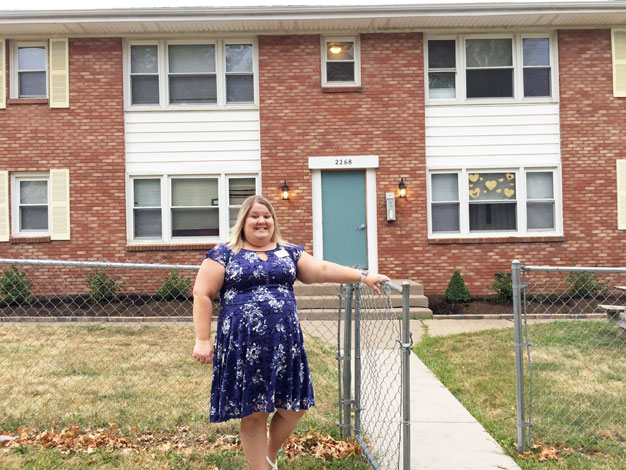
Ashley Velez, executive director of Humility Homes & Services in Davenport, stands in front of the first property the nonprofit agency opened 30 years ago for people in need of a home.
By Barb Arland-Fye
The Catholic Messenger
One day last month, 160 people with urgent requests for rental assistance called The Salvation Army Quad Cities, said Kelle Larned, the agency’s program and operations director. The COVID-19 pandemic has exacerbated the affordable housing crisis, but Larned and other members of the Quad Cities Housing Cluster have introduced a long-term vision to address affordable housing needs called Silos to Solutions. Other communities in the Diocese of Davenport also face challenges with affordable housing and might look to the Silos to Solutions Initiative as a template.
Cluster members presented their vision during a virtual conference Aug. 28 and identified six strategies “to create a path to address affordable housing needs in our community,” said Leslie Kilgannon, director of the Scott County Housing Council. The council serves as the cluster’s resource development arm.
In the midst of a pandemic that laid bare the inequities in society, particularly for households with extremely low incomes, “We need to step it up … to address a long-standing issue in a systemic way,” Kilgannon said. She and other cluster members underscored the need for broad community engagement, signified by the vision’s title, “Silos to Solutions.”
“It’s opening up the conversation so we’re not functioning as silos,” Ashley Velez, executive director of Humility Homes & Services told The Catholic Messenger. She and Ryan Bobst of her staff helped with development of the six strategies that serve as the vision’s blueprint:
Production — Address the gap of 6,645 affordable units for households (in the Quad-Cities) identified as Extremely Low income, through a combination of new construction, rehabilitation of existing properties no longer on the market or fit for habitation, and bringing affordability through rental subsidies.
Preservation — Maintain, improve and/or rehabilitate 95 percent of existing affordable units to ensure availability and quality.
Protection — Reduce eviction rates through coordinated efforts to provide tenant education and advocacy, minimize unsafe living conditions, distribute homeless prevention funds and resolve landlord-tenant disputes through mediation.
Provision — Provide services that help individuals and families maintain housing stability.
Payment — Increase the (region’s) Local Housing Trust Fund to provide $1 million annually, available in both the Iowa and Illinois Quad Cities.
Partnership — Engage community partnerships, program participants, and citizens to foster dialogue and generate action on affordable housing.
Velez said HHSI will lead the effort on the fourth strategy — provision of services because of the agency’s knowledge and experience in that area. This year marks the 30th anniversary of HHSI, which began as Humility of Mary Housing Inc.
On Sept. 1, 1990, the sisters of the Congregation of the Humility of Mary opened the first residence providing safe housing for single mothers. From those roots, the agency has grown to include an overnight shelter and affordable, low-barrier housing for individuals and families through HHSI’s Mission Focused Housing Program.
Velez said the “pandemic made us evaluate our original plans and how to better serve the community that needs us more than ever.” From March through Aug. 31, HHSI has served 677 individuals and families experiencing homelessness, a 20% increase in the number of individuals served during the same period last year.
She believes Silos to Solutions will enhance collaboration, communication and success in obtaining grants from national, large-scale funders that have been out of reach because they base funding on a larger population being served.
The planning process that led to the Silos to Solutions initiative began nearly 20 months ago, long before the pandemic accelerated the affordable housing crisis. Frontline service providers such as Velez and Larned of the Salvation Army witness the acute need on a daily basis.
People in need of housing on both sides of the Mississippi River in the Iowa and Illinois Quad Cities begin their quest at the Salvation Army on Kirkwood Boulevard in Davenport. After assessing the individuals’ situation and housing needs, the Salvation Army refers them to a local agency that can provide the needed services.
The Salvation Army has provided rent assistance to 259 households (400 people) between March and August of this year, more than double the number assisted for the same period a year ago. “We have 59 people in hotels right now for shelter. We are filling more hotel rooms for shelter this week as well so that number will increase a lot by the end of the week,” Larned said.
“Some days we get 100 calls a day for people who need rental assistance (aside from the day when 160 people called),” Larned said. Not everyone receives help because of grant guidelines, but “we process applications as quickly as we can, so we can serve as many households as possible.”
“The number of calls has been steady for the last couple of months and households owe a lot of money, but the big issue is that households have not paid rent for four, five or six months and owe thousands of dollars,” she said. The Salvation Army can assist with back rent of two to three months, but many people “still owe a couple of months and landlords still want to evict.”
However, some landlords will work with tenants who reach out to them. When tenants do not talk to their landlords, they receive eviction notices. “We have been able to advocate for some of the households we are assisting with landlords — like getting them to reduce late fees or dropping them all together,” Larned added.
She believes that the Silos to Solutions initiative is on the right track. “We need to work on getting some people to commit to this vision. We need city officials from each Quad City; we need construction companies, etc. The more we have committed to the vision the more leverage we have moving forward.”
The crisis in affordable housing
Wages failing to keep pace with rental costs has contributed significantly to the affordable housing crisis in the Quad Cities and throughout Iowa and the nation. A report from the Quad Cities Housing Cluster on a vision to create a path to affordable housing found that wages have increased 15.9 percent since 2010 in the Quad Cities. However, rental costs increased 23.7 percent in Rock Island County, Illinois, and 21.8 percent in Scott County, Iowa.
Additionally, since 2010, the Quad Cities has lost 30.5 percent of fair market units in both units that have become dilapidated and closed and in units where rent has risen above fair market rate. In the Quad Cities, 15,455 households (12.1% of total households) live with extremely low incomes, or 30% Area Median income, $21,810 annually.
Source – QC Housing Cluster Silos to Solutions report
How you can help
Quad Cities Housing Cluster needs partners willing to bring the Silos to Solutions initiative for affordable housing to fruition. Please contact Leslie Kilgannon at (563) 323-0420 or send an email to qchousingcluster@gmail.com The mailing address is QC Housing Cluster, 1212 W. 3rd St., Davenport, Iowa, 52802











